(Tami Nutall Jefferson, a married mother and grandmother, is going back to school and she has invited us all along to enjoy the ride. For more posts in this series, click here: Tami’s Big Do Over. – ABT )
by Tami Nutall Jefferson
Lessons Learned
The Fall 2017 semester is wrapping up, and the lessons have been many.
For instance, my landscape architecture course was confirmation of how much I dislike history. Yet, I learned that much of today’s architecture, city and town planning, societal philosophies, gentrification, classism, religion and so much more actually originated thousands to hundreds of years ago in the Europe and Asia. I realized the Bible is true, when it says that “…there is [absolutely] nothing new under the sun.” The point is, whether in college or not, learning expands your view and objectivity of the world and helps put all of its issues into perspective – a perspective which is often skewed by inaccurate media, gossip, myths, legends, and lack of a knowledge of history and other cultures.
As for myself, I learned that, while the university application process can be intense, that same level of intensity is not built within every student. I assumed that every student, would have the same fervor, over-achieving spirit, and GPA that I have. I realized during the course of my first group project, that is so not the case. Everyone cannot perform academically well, nor do they want to when they have other classes and social activities to prioritize. I learned, through the help of my Leadership Plenty cohorts, that I really have to meet people where they are and not weigh them (or myself) down with my super high expectations.
I also learned that people need stuff to do – all day, everyday. I only took two classes because I wanted to ease into this TAMU academic life and not overload myself. What actually happened was that I underwhelmed myself. I had way to too much time on my hands; time that I filled with volunteering, business, and Monk (the TV show). My courses, I ended up procrastinating on because I knew I could do it in the final 2 hours before deadline. So, next semester is jam-packed with courses and work. The extra pressure actually leads to greater productivity.
Greatest lesson of all – for someone who’s car drives only a maximum of 15 minutes from home, in any direction – is that I (and my car) can actually make the 82-mile drive to Bryan-College Station with a smile. I practiced several times this year. I’m in training for the 2018-19 school year, when I’ll have to make that drive weekly.
A Journey Between Sisters
My next – and last – “old lady student” interview this semester, is my very own sister. The back story is that I’ve always been thought of as the career student in the family, while we were just glad that she finished high school. She never voiced her dreams or goals; she just existed in her own happy world. She’s definitely the Type C to my Type A personality. Early in her 20’s, she got a necessity-job as a nursing home nurse’s aid. We were proud of her for just doing something. But out of all of us, she’s been the most stable one over the last 2 decades with her job and family. But this summer, she shocked me, when she enrolled for her first semester at college. You would think I already know the answers to these questions, but I’m learning them just as you are. So, it is my pleasure to hear her journey. Let the interview begin.
Something About Erica
TNJ > Hello Sister. You haven’t been to school since high school in 2001. What made you think of going back to school at 34 years old and what made you actually decide to do it?
EW > I have been thinking about going to school for the last 3-4 years, but I’ve always found a reason not to go – made up a gazillion excuses. But what made me actually decide to go was just looking at my kids and realizing I want more for them and I’m tired of living paycheck to paycheck. I have a job, but jobs usually do not get you very far. I needed a career.
TNJ > What are you studying and how will it change your and your family’s life.?
EW > I’m studying Nursing. My end goal is to be a Director of Nursing, still in the long-term care industry. Nursing will change my life by allowing me to be more able to adequately provide for my family.
TNJ > What does it feel like being a first-time college student at 34?
EW > Going back to school after being out for some years is a bit challenging. Trying to balance all the schedules that I have in life such as work, school, and kids plus trying to study and do homework is a bit harder for me then it would be for some of my classmates who do not have half of those responsibilities. I’m trying my best to embrace being a first-time student though.
TNJ > What have you learned so far after your very first semester?
EW > What I’ve learned so far this school year is that I need to manage my time more wisely. Procrastination is not my friend. I need to go ahead and start on assignments, if possible, as soon as I get them so I won’t be cramming hard the night before.
TNJ > What advice would you give to another person thinking they’re too old to go to college or they’re not the “academic type”?
EW > My advice to anyone is go ahead and go to school. Age doesn’t matter. These years are going to pass anyways so you might as well be in school trying to improve your economic situation. You cannot focus on what could happen 2 years from now or how you will pay for college. You just have to do it. It will all work itself out.
Thank you Erica. Good luck on your journey. And happy holidays Waco.
 Erica Williams is a student at Lone Star Community College in Houston, and is earning her Associate of Science degree for Nursing. Erica currently manages the medical records department at a long-term nursing facility, in addition to a household of 3 beautiful children and 1 husband.
Erica Williams is a student at Lone Star Community College in Houston, and is earning her Associate of Science degree for Nursing. Erica currently manages the medical records department at a long-term nursing facility, in addition to a household of 3 beautiful children and 1 husband.
 Tami Nutall Jefferson is an older, non-traditional student with a professional real estate background. Tami begins her first academic year at Texas A&M University pursuing a Bachelor’s Degree in Urban Planning and Real Estate Development while commuting between Waco and College Station. Her hope is that Waco becomes the most attractive, modern, vibrant, and prosperous version of itself as an inclusive city and her mission is to help make that happen as a real estate developer and entrepreneur. Tami volunteers her time and voice to several downtown Waco placemaking and economic development causes and organizations. To engage and share your non-traditional student experiences with Tami, contact her at [email protected] or connect with her on Facebook https://www.facebook.com/tami.nutall.94
Tami Nutall Jefferson is an older, non-traditional student with a professional real estate background. Tami begins her first academic year at Texas A&M University pursuing a Bachelor’s Degree in Urban Planning and Real Estate Development while commuting between Waco and College Station. Her hope is that Waco becomes the most attractive, modern, vibrant, and prosperous version of itself as an inclusive city and her mission is to help make that happen as a real estate developer and entrepreneur. Tami volunteers her time and voice to several downtown Waco placemaking and economic development causes and organizations. To engage and share your non-traditional student experiences with Tami, contact her at [email protected] or connect with her on Facebook https://www.facebook.com/tami.nutall.94
By Glenn Robinson
Health care is among the most heavily regulated industries in America – virtually every aspect of the health care system is subject to government oversight.
There are regulatory mechanisms to supervise the doctors and professionals who render care; the institutions in which care is provided, such as hospitals and clinics; the medications and medical devices that are the tools of care; and the insurance coverage that finances it all. These regulations are developed and implemented by all levels of government — federal, state and local — as well as private organizations.
Everyone in health care agrees that regulations and standards are necessary to ensure compliance and to provide safe health care to every patient. Policy debates, for the most part, typically focus not on whether oversight should exist, but rather on how it should be structured. Impartial, external oversight is considered necessary to protect the public interest – even by those who are especially suspicious of government bureaucracy.
American health care has flourished over the past 100 years. Rather than hindering its progress, the complex system of government regulation actually may have served to support and nurture it.
Consider, for example, the public confidence engendered in the competence of physicians through licensure requirements and in the safety and effectiveness of prescription drugs through the Food and Drug Administration’s approval process.
Another form of regulation is known as HIPAA. At some point while filling out a bevy of forms at the doctor’s office, you may have run across this term.
The Health Insurance Portability and Accountability Act, or HIPAA, was passed by Congress in 1996 and was intended to improve health care efficiency by standardizing electronic data exchange and protect the privacy of patient records.
Since 2010, as part of national health care reform, there has been increased urgency in transitioning to digital versions of patients’ paper charts called electronic health records, or EHRs.
EHRs can contain a patient’s medical history, diagnoses, medications, treatment plans, immunization dates, test results and more. But they’re not just a replacement for paper charts.
Part of what makes EHRs so powerful is that they also allow doctors and other care providers to access evidence-based tools that can be used to make decisions about a patient’s care in real time.
Another key advantage of EHRs is convenience. Health information can be created and securely managed digitally by authorized providers and shared with other providers at other locations.
This helps cut down on the number of forms patients must fill out and can eliminate the need for duplicate testing, as well as promote legible, complete medical documentation for streamlined coding and billing.
With all this information available to be shared with the touch of a button, precautions must be taken to ensure the privacy of the patient. As EHRs continue to evolve, so must our regulation of them.
The HIPAA law’s privacy standards strive to give patients rights over their health information, and set boundaries on who can receive a patient’s personal health information. Those who must follow the law include healthcare providers such as hospitals, doctors and nurses, pharmacies, insurance companies, and government programs such as Medicare and Medicaid.
The law limits the use of patient information by health care providers to specific purposes. Patient information can only be shared if it is necessary to coordinate treatment, pay providers for patient care, protect public health, assist police in criminal investigations, or assist family, relatives or friends responsible for care or paying medical bills – unless the patient objects.
HIPAA also requires healthcare providers to inform patients how they may use and share their health information, and grants certain rights to patients regarding their health information, such as receiving copies of their health records upon request and being informed if their health information is being used or shared.
If you are ever concerned that your personal health information is being improperly used or shared, you have the right to file a complaint either with the federal government or your healthcare provider.
So while regulation may be seen merely as red tape in some industries; in health care, it provides a critical public protection.
This report, and other episodes, are available at KWBU.org.
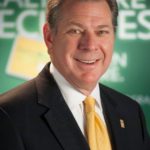 Glenn Robinson is the President of Baylor Scott & White Medical Center – Hillcrest. He has over 30 years of experience in hospital and health care management, and currently serves on several Boards associated with the Texas Hospital Association and the American Hospital Association. In addition, Glenn is Past-Chair and an active member of the Greater Waco Chamber of Commerce, and serves on the Prosper Waco Board.
Glenn Robinson is the President of Baylor Scott & White Medical Center – Hillcrest. He has over 30 years of experience in hospital and health care management, and currently serves on several Boards associated with the Texas Hospital Association and the American Hospital Association. In addition, Glenn is Past-Chair and an active member of the Greater Waco Chamber of Commerce, and serves on the Prosper Waco Board.
By Hannah Rigg
A neighborhood school. Each morning children are dropped off at the front entrance of Brook Avenue Elementary School and personally greeted by Brook Avenue staff as they make their way to their classrooms. Each afternoon, those same families are congregated outside of the school waiting to walk home with their children. This is what a neighborhood school looks like.
Brook Avenue is in the second year under the leadership of Principal Sarah Pedrotti and Assistant Principal Jessica Torres. They are faced with the challenge of leading Brook Avenue out of the Improvement Required status as set by Texas Education Agency (TEA). You may have read recently that Brook Avenue is one of the five Waco ISD campuses that is at risk of closure at the end of the 2017-2018 school year. Although the threat of closure is one reality, excellence is the reality that Brook Avenue is living into. To ensure excellence, it will take the full dedication of this Waco community.
In the three full months that I have been working at Brook Avenue, I have experienced a transformed campus. Students are provided with opportunities to improve their reading skills through CIS groups, Kids Hope USA mentors, and literacy groups with staff. Students receive a book on their birthday.
When students miss class, they miss instruction time with their teacher and classroom engagement. We need our students in the classroom actively engaging in the work they are completing to ensure increased test scores. At Brook Avenue, attendance is rewarded at each six-week period in order to encourage students to come to school consistently.
Communication between the school and community has increased, and so has the level of involvement.
Brook Avenue is redefining itself as a neighborhood school where families and community members are invited onto campus. The first Tuesday of each month you will find a group of parents gathered in the lunchroom for Coffee and Conversations. The November meeting was filled with determination as parents refuse to allow Brook Avenue to fall below standards for another consecutive year. Every parent in attendance signed up to volunteer to read with students or to support teachers by completing preparation activities.
As Brook Avenue continues to work towards success, they are creatively supported by their new staff provided by the Texas Title I Priority Schools (TTIPS) Grant, Columbus Avenue Baptist Church (Kids Hope USA Mentors), Communities in Schools (CIS), Klaras Center for Families, and the BEAR (Be Emotionally Aware and Responsive) Project. Each agency has responded zealously to the call for improvement this school year.
The TTIPS grant has allowed Brook Avenue to become a campus of innovation. Initiated by parents and funded by the TTIPS Grant, an outdoor classroom will be created in the back of the school allowing teachers to uniquely engage their students during lessons. And, a Maker’s Space allows students to utilize creativity as they bring their learning to life. The TTIPS grant made it possible to purchase one iPad for each student to promote technological learning. It also heled support non-traditional seating options for classrooms so that the classroom can be arranged to better suit the learning styles of the children. The grant has also enabled additional learning trips for all students. These trips give students an opportunity to make connections between their classroom learning and hands on real-world experience. As a campus, we are honored that the state has recognized Brook Avenue as a priority for receiving this funding and it is essential that our community recognize Brook Avenue as a priority as well.
Look for the hashtag #BrAveLearns on Twitter, Instagram, and Facebook throughout the year as we watch Brook Avenue achieve success. Our students are learning, our teachers are engaging, and our community is behind us. The next time you see Brook Avenue Elementary School in the news, look for their accomplishments.
 Hannah Rigg is a student in the Diana R. Garland School of Social Work and serves as a social work intern on campus at Brook Avenue and West Avenue Elementary Schools through the BEAR Project. She has been living in Waco for two years and loves exploring this city.
Hannah Rigg is a student in the Diana R. Garland School of Social Work and serves as a social work intern on campus at Brook Avenue and West Avenue Elementary Schools through the BEAR Project. She has been living in Waco for two years and loves exploring this city.
By Major Anita Caldwell
In 1890, William Booth, the founder of The Salvation Army, wrote Darkest England and the Way Out. He envisioned a world where the poor and needy were provided a way out of their poverty. He was convinced that a cab horse was treated with a better standard of living than the poor of London. He opened a work bureau to help people find work. Next, he purchased a farm where men could be trained in various forms of work so they could get employment and gain self-respect. A match factory was operated by The Salvation Army to provide work as well. He laid a foundation for impact assistance.
Serving McLennan County since 1891, The Salvation Army is dedicated to serving the community and being good stewards of donor dollars. Widely recognized for our homeless shelters and community soup kitchen, our services extend far beyond essential needs. While meeting emergency needs is critical, our goal is to identify the underlying causes of crisis and tailor our services to break the cycle of poverty for this and future generations as we guide individuals toward long-term financial stability and independence.
We join Prosper Waco and United Way of Waco – McLennan County in addressing education, financial security, and health along with our providing essential services to those who walk through our doors.
We educate others daily in the following areas:
- Youth – Character building classes, music education, and church youth group activities provide opportunities to continually educate youth with life-long skills to empower them into adulthood and break the cycle of poverty and crisis.
- Homeless – One-on-one case management, life skills classes and employment referrals are provided to homeless families and single individuals to identify and address any educational gaps preventing their success.
- Veterans – Life skills and budgeting classes are offered through one-on-one case management.
- Seniors/Disabled – Our William and Catherine Booth Apartment Complexes provide an affordable housing option for low-income seniors and disabled adults. The Salvation Army also affords education in life skills, health and nutrition, and assistance with home health care benefits to the residents. We connect residents to vocational training, money management, budgeting, lease education and other programs to prevent issues of poverty.
- Inmate Reintegration – Life-skills and job skills are key aspects of our Fresh Start program provided to newly released inmates to guide them toward successful re-integration into the community.
- Red Kettle Employment Program – This program generates on-the-job training for shelter residents.
- Anti-Trafficking Prevention Education – The Salvation Army Officer is an UnBound Professional Trainer and leads prevention training with parents specifically at local churches and community groups.
We work towards financial security in the following ways:
- Homeless Families – Budgeting skills and financial planning are shared with homeless families, singles, elderly, and youth.
- Veterans – Rental assistance and utility assistance are provided to prevent homelessness.
- Christmas Assistance – Budgeting review is provided to Toys for Tots applicants.
- Empowerment Angel Tree Program – A budgeting seminar and follow-up consultation are given to each participant.
- Homelessness Prevention – Helps stabilize families via budget review and financial support.
- Rapid Rehousing – We engage ongoing support/budget counseling until a family is stabilized.
- Red Kettle Employment Program – Assists shelter residents with finances for next steps.
- Seniors/Disabled Booth Apartments – Residents receive benefits/entitlement assistance, case management, crisis intervention, and assistance with tax preparation.
- Fresh Start – Inmate reintegration services include budget education, job search and savings program.
We support those who come to us with their health needs by:
- Women – Health education to homeless women, seniors, other program participants.
- Youth – A range of programs are taught, such as first aid.
- Veterans – Meals and shelter are free for veterans while they gain support through the VA hospital.
- Adult Rehabilitation – For those ready to overcome drug/alcohol addiction, transportation is provided to one of five Salvation Army free addiction treatment centers in Texas.
- Community Hunger – The Community Kitchen provides hot, nutritious meals daily to those facing hunger.
- Warming/Cooling Centers – The Salvation Army Community Kitchen and Family Store serve as community warming or cooling centers during extreme weather, providing respite and replenishment.
- Senior/Disabled – Booth Apartment Complex programs assure adequate nutrition, mental health services, isolation assistance and substance abuse referral as needed.
- Homeless – Referrals to mental and physical health assistance as needed.
- Fresh Start – Inmates receive nutritious meals, counseling, drug/alcohol training and medical assistance.
- Spiritual – The Salvation Army church meets for worship each Sunday at 11 am. All are welcome.
Finally, we support this community with those emergency essential needs:
- Food Pantry – Emergency food to families in need.
- Clothing and Household Vouchers – The Salvation Army voucher program allows those living in poverty and those newly re-housed, including families and veterans, to receive critical supplies free of charge through our Family Store. Furnishings are provided to any victims of fire who have a Red Cross referral.
- Transportation vouchers – Bus tickets.
- Meals – Served daily at The Salvation Army Community Kitchen and during disaster response from the mobile kitchen.
- Emergency Shelters – Short-term crisis housing for men, women and families with children.
- Emergency Disaster Services – Including on-scene disaster assistance, post-event care and crisis intervention through case management.
While some people might think we simply provide “three hots and a cot”, we engage in upending the root causes of need while providing emergency services to those who come through our doors. Please call our office to volunteer in any of these areas as we seek to truly make a deep and lasting difference in McLennan County.
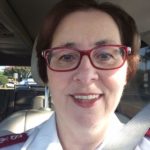 Major Anita Caldwell was born in Olean, NY, to a family of ministers. She attended and graduated from Kentucky Mountain Bible Institute with a BA in Religion. Her MA is in Pastoral Leadership from Olivet Nazarene University. She and her husband, Bradley Caldwell are Majors in The Salvation Army and are Regional Coordinators for this area. They have served as ministers of the gospel in The Salvation Army for 24 years. After serving in three USA appointments, they were transferred as Regional Leaders in Moldova, Romania, Russia and the country of Georgia over a twelve-year period. They received their Waco assignment after serving at International Headquarters in London, UK.
Major Anita Caldwell was born in Olean, NY, to a family of ministers. She attended and graduated from Kentucky Mountain Bible Institute with a BA in Religion. Her MA is in Pastoral Leadership from Olivet Nazarene University. She and her husband, Bradley Caldwell are Majors in The Salvation Army and are Regional Coordinators for this area. They have served as ministers of the gospel in The Salvation Army for 24 years. After serving in three USA appointments, they were transferred as Regional Leaders in Moldova, Romania, Russia and the country of Georgia over a twelve-year period. They received their Waco assignment after serving at International Headquarters in London, UK.
The Act Locally Waco blog publishes posts with a connection to these aspirations for Waco. If you are interested in writing for the Act Locally Waco Blog, please email [email protected] for more information.
(The Heart of Texas P-20 Council includes representatives from K-12 education, higher education and employers. They meet regularly to help coordinate efforts to launch our young people into productive lives as workers and citizens. This post is one in a monthly series of posts intended to share information about the work of this important group in our community. For more posts in this series, click here: P-20 education. – ALW)
By Christine Holecek
All across Texas, students are finding their voices, setting goals, and taking steps towards securing their own successful futures. Through these efforts, they become an integral part of a growing movement known as Generation TX. These students are what’s next for our state. They have the power to become the most successful generation ever.
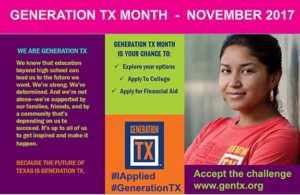 What is Generation TX Month? Generation TX Month combines college admissions and financial aid application efforts into one. Generation TX Month events are designed to take place when schools and community organizations typically host college fairs, financial aid drives, and other college and career-related events. The Generation TX Month provides the perfect opportunity to build on these initiatives around college and career readiness, pull them together to make a broader impact, and expand their reach.
What is Generation TX Month? Generation TX Month combines college admissions and financial aid application efforts into one. Generation TX Month events are designed to take place when schools and community organizations typically host college fairs, financial aid drives, and other college and career-related events. The Generation TX Month provides the perfect opportunity to build on these initiatives around college and career readiness, pull them together to make a broader impact, and expand their reach.
Generation TX Month focuses on getting students, especially those in middle school and high school, thinking about their future with a range of actions and next steps that they can take toward college and career readiness, including:
Prepare (Middle & High School Students)
- Career Exploration
- Finding a Mentor
- Creating a Brag Sheet
- College Visits
- PSAT, SAT, ACT
Apply (High School Seniors)
- College Applications
- Financial Aid Applications
- College Scholarships
Download your planning guide today
The Heart of Texas P-20 Council believes that achieving college and career readiness allows students to reach their fullest potential. By accepting the GenTX challenge the council is acknowledging the focus on the future of our workforce and encouraging them to focus on their goals for college and career. GenTX also provides a college planning and financial aid guide to help parents and students make decisions about the future.
Download College Planning & Financial Aid Guide
Student Tools
- ApplyTexas – If you are applying to a public two-year or four-year institution in Texas, you will need to complete the ApplyTexas application. This application is available at www.ApplyTexas.org. Once completed, you can use this one application to apply to many schools across Texas.
- Applying for Financial Aid – The FAFSA is the primary form you will need to apply for most financial aid
- College Major – What College Major is best for you? Find out at MyMajors After taking this assessment, you will be recommended the top majors, colleges and careers based on your academic achievements, interests and personality.
Generation Texas Month supports the regional efforts and goals of the 60x30TX Texas Challenge to Reach Higher, an initiative to increase college applications, FAFSA completions, and college readiness across Texas.
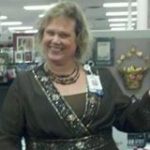 This Act Locally Waco blog post was written by Christine Holecek. Christine is an Education Specialist at Education Service Center Region 12 in Waco. She has worked in the area of Adult Education and Career & Technical Education for the past 25 years. She earned an AAS degree from MCC, a BAAS and Master’s Degree from the University of North Texas and is currently enrolled in the Doctoral Program in Educational Leadership and Policy Studies at Tarleton State University.
This Act Locally Waco blog post was written by Christine Holecek. Christine is an Education Specialist at Education Service Center Region 12 in Waco. She has worked in the area of Adult Education and Career & Technical Education for the past 25 years. She earned an AAS degree from MCC, a BAAS and Master’s Degree from the University of North Texas and is currently enrolled in the Doctoral Program in Educational Leadership and Policy Studies at Tarleton State University.
The Act Locally Waco blog publishes posts with a connection to these aspirations for Waco. If you are interested in writing for the Act Locally Waco Blog, please email [email protected] for more information.
By Diego Loredo
Finally, after coming to University of North Texas, I am close to graduating with a degree in public relations. I first attended UNT in 2014 and now I am set to graduate next semester in May. The time has seriously flown by and here are just a few things that I have experienced and am dealing with right now.
Throughout my years at UNT, I have met many great people. I’ve met them in my dorm during my freshman year, in class, at work, or even just walking through campus or through downtown Denton. However, there’s a group of people that I especially am grateful to have met. I met these guys during my freshman year and what really got us together was soccer. We competed in outdoor and indoor soccer intramurals at UNT and have done it every semester ever since. Not only that, but we go out together a lot. Whether it’s to a party, to a restaurant, or even to go out of town, we’re usually together. These guys are more than my friends, they’re my brothers and having them by my side has made this senior year a lot less stressful.
One thing that I have realized is that time waits for no one. I’m almost at the end of my college career and I am in need of experience, work experience. I have attended a few college fairs and am also applying to several internships. This is something I wish I had done sooner because now I am kind of in a rush to get an internship for next semester. In the school I’m in we are required to intern somewhere in order to graduate. I could have done one during the summer but I was struggling financially back then so I decided to work instead. Now that I’m fine (financially) I am doing my best to find an internship that best suits my needs and what I want to do after college.
With senior year comes a lot of stress and this is something that I am currently dealing with. “Will I be able to graduate in time?” “Will I pass my classes?” “What about an internship? Is there anyone who will allow me to intern there?” These are all questions that go through my mind every day, along with many others.
Senior year can be scary. In less than a year, I’ll be out there on my own starting my own career. I get anxious whenever I think about it but I also get excited at the many opportunities that are available. Whenever I get stressed out, I talk to my roommates about it or I talk to my closest friends. It’s crucial to have that group of friends that you can always count on to help you when you’re feeling stressed out. Another way that I have dealt with it is going out, either to eat or to just get out of the house. This helps get my mind off of what is bothering me and has worked a lot this year and previous years as well.
Not everything is going to go your way in college. I’ve failed classes, embarrassed myself many times, struggled both academically and financially, and I’ve been discouraged whenever I see other people doing things better than me. But I’ve never let it keep me down. I’ve retaken those classes with the help of other friends, I’ve come to accept the times I’ve embarrassed myself and even joked about it a few times, I got over my financial struggle and am working to get over my academic struggle, and I now get motivated whenever I see someone in a better situation than me. You learn a lot about yourself during college. My goal now is to finish this semester strong and go home to enjoy the holidays with my family before I take my final semester at UNT. I plan on taking it day-by-day and make sure I take in every bit of “the college life” before I move on to the next step in my career.
 Diego Loredo is a senior at the University of North Texas and is majoring in public relations. He is a scholarship recipient of the Brazos Education Foundation, otherwise known as “Brazos Scholars.” He graduated from University High School in 2014. He plans on working in sports PR or for a nonprofit. He loves to play soccer and is a huge FC Dallas fan.
Diego Loredo is a senior at the University of North Texas and is majoring in public relations. He is a scholarship recipient of the Brazos Education Foundation, otherwise known as “Brazos Scholars.” He graduated from University High School in 2014. He plans on working in sports PR or for a nonprofit. He loves to play soccer and is a huge FC Dallas fan.
By Stephanie Endicott
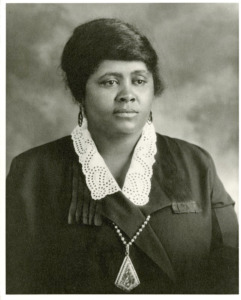 Jeffie Obrea Allen Conner was born in 1895 on her family’s farm in Harrison Switch, Texas. She was the oldest of three children born to Meddie Lilian and Jeff D. Allen. Harrison Switch, later known as Harrison, was a small African American community eight miles southeast of Waco. Conner’s parents, and most other residents of Harrison, owned their own farms. This was notable in a time when the majority of African American farmers in Texas were sharecroppers.
Jeffie Obrea Allen Conner was born in 1895 on her family’s farm in Harrison Switch, Texas. She was the oldest of three children born to Meddie Lilian and Jeff D. Allen. Harrison Switch, later known as Harrison, was a small African American community eight miles southeast of Waco. Conner’s parents, and most other residents of Harrison, owned their own farms. This was notable in a time when the majority of African American farmers in Texas were sharecroppers.
Conner showed great intelligence from a young age, and by 1914, she graduated from Prairie View Normal School, later known as Prairie View A&M, with a teaching certificate. She supported herself by teaching in various McLennan County schools. In 1923, Conner married a prominent Waco doctor, George S. Conner, and moved to his Waco home on 12th Street. Dr. Conner was thirty-one years her senior.
That same year, Conner left her job as a teacher to become a home demonstration agent, employed by the U.S. Department of Agriculture. The demonstration program was founded in 1912 as a way to teach rural girls homemaking skills, but soon grew with the help of federal funding and statewide organization. The program provided support to farming families by supplementing clothing, undertaking home improvement projects, and even funding scholarships.
Due to segregation, Conner was only allowed to work with black women and families. Conner’s childhood years spent on the farm, as well as her training as a teacher, made her an excellent choice for the position. Conner taught women practical lessons, such as homemaking, sewing, basic healing, better farming techniques, and personal hygiene. Due to her influence, rural schools switched from a shared ladle to individual drinking cups for school children, cutting back on the spread of germs. She traveled throughout McLennan County during the week, and stayed with her husband in Waco on the weekends.
Conner furthered her academic studies as well, returning to Prairie View and earning a bachelor’s degree in home economics in 1934. After receiving her degree, she was promoted to supervisor of home demonstration agents, which meant she was in charge of the program for all of Central Texas. She continued to travel during the week, staying in private homes, because segregation kept her from staying in hotels. In 1939, Dr. Conner died. Conner, at the age of forty-four, found herself a widow, once again supporting herself. She returned to school, and in 1944 received her Master’s degree in home economics from Prairie View.
In 1948, Conner left her position with the home demonstration program to become supervisor of the black schools of McLennan County. She found that black schools had far less supplies, inferior accommodations, and a lack of funding compared to the white schools in the county. Conner fought to reform this injustice, and combined the thirty-five smaller schools into fourteen larger ones in order to make the most use of the limited resources available.
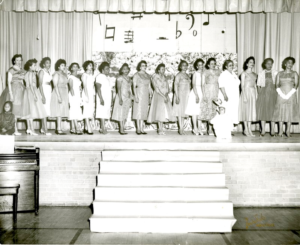 In 1952, Conner retired but continued to live an active and involved lifestyle, persisting in her quest to make a difference in people’s lives. She was part of multiple social sororities, served as president of the Texas Federation of Colored Women’s Club and was influential as a member of the National Association of Colored Women’s Club. In 1966 she was appointed to the State’s Committee on Public School Education by Governor John Connally. Conner continued to be a faithful member of New Hope Baptist Church, and an active member of her community, serving throughout Waco and McLennan County until her death on June 10, 1972 at the age of 76. Jeffie Conner is remembered as one of the outstanding professional women of Waco, paving the way for future black women to follow in her footsteps and make a difference.
In 1952, Conner retired but continued to live an active and involved lifestyle, persisting in her quest to make a difference in people’s lives. She was part of multiple social sororities, served as president of the Texas Federation of Colored Women’s Club and was influential as a member of the National Association of Colored Women’s Club. In 1966 she was appointed to the State’s Committee on Public School Education by Governor John Connally. Conner continued to be a faithful member of New Hope Baptist Church, and an active member of her community, serving throughout Waco and McLennan County until her death on June 10, 1972 at the age of 76. Jeffie Conner is remembered as one of the outstanding professional women of Waco, paving the way for future black women to follow in her footsteps and make a difference.
Cite this post: Stephanie Endicott, “Jeffie Conner,” Waco History, accessed November 8, 2017, http://wacohistory.org/items/show/161.
 Waco History is a mobile app and web platform that places the past at your fingertips! It incorporates maps, text, images, video, and oral histories to provide individuals and groups a dynamic and place-based tool to navigate the diverse and rich history of Waco and McLennan County. It is brought to you by the Institute for Oral History and Texas Collection at Baylor University.
Waco History is a mobile app and web platform that places the past at your fingertips! It incorporates maps, text, images, video, and oral histories to provide individuals and groups a dynamic and place-based tool to navigate the diverse and rich history of Waco and McLennan County. It is brought to you by the Institute for Oral History and Texas Collection at Baylor University.
The Act Locally Waco blog publishes posts with a connection to these aspirations for Waco. If you are interested in writing for the Act Locally Waco Blog, please email [email protected] for more information.
By Fiona Bond
Ever since Creative Waco was formed, just over 2 years ago, we have heard from people of all kinds in Waco about their dreams for making Waco a hub for arts and culture. It’s one of the most enjoyable aspects of our work – hearing about seedling ideas that, with the right support, could grow and bear fruit.
But often those questions were accompanied by a question: “How can we know if this could work?”
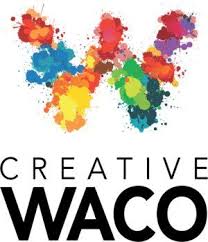 How do we know if Waco is the kind of City that could develop and sustain new art galleries, festivals, theatres, live music venues, artists’ studio spaces, and all the kinds of activity that would really make our city feel like a vibrant, thriving hub of activity that would not only draw residents, but attract visitors, too?
How do we know if Waco is the kind of City that could develop and sustain new art galleries, festivals, theatres, live music venues, artists’ studio spaces, and all the kinds of activity that would really make our city feel like a vibrant, thriving hub of activity that would not only draw residents, but attract visitors, too?
To begin to answer these questions, we turned to that most powerful of storytelling and question-wielding tools – statistics! One of Creative Waco’s first activities was to gather attendance and income/expenditure data throughout the whole of 2016 from Waco’s 29 non-profit arts and cultural venues and programs. This was part of a national survey conducted by Americans for the Arts as part of their “Arts & Economic Prosperity 5” study, which happens across the whole of the USA. This lends considerable kudos to the results and gives the added benefit of allowing us in Waco to compare our findings with peer communities across the nation.
When the results were announced in June, we discovered some fascinating things about Waco. These are stories we want to share as we now work with the Baylor Business School to explore what comes next.
- Waco’s non-profit arts and cultural sector punches above its weight! These organizations and activities (think museums, galleries, live performances, festivals, etc.) deliver $63.7million in economic impact, support 2,184 FTE jobs and contribute $7.4 million in state and local government tax revenue. That’s a whopping twice the economic impact you would expect for a city our size.
- Waco’s non-profit arts and cultural activities bring all kinds of people together! Arts audiences in Waco showed a healthy spread of age, economic and cultural diversity.
- People choose to visit Waco for its arts and cultural activities: Over half of the out-of-town visitors surveyed had come to Waco specifically for the arts event or activity they were attending.
- Waco audiences spend less on “accompanying” experiences such as food
 and drink than they do in comparable cities…an average of $5 less per person, actually. The reason appears to be that many of our cultural activities are taking place in venues that don’t offer food and drink, or are not particularly convenient for restaurants, bars or cafes. The Waco Hippodrome, unsurprisingly, stands out as a major exception to that pattern!
and drink than they do in comparable cities…an average of $5 less per person, actually. The reason appears to be that many of our cultural activities are taking place in venues that don’t offer food and drink, or are not particularly convenient for restaurants, bars or cafes. The Waco Hippodrome, unsurprisingly, stands out as a major exception to that pattern!
You can see the full results of this study at creativewaco.org/aep5 and we’d love to hear your ideas about the exciting opportunities for growth presented by these findings. We are also testing these results through practical experiments, such as the wonderfully successful Waco 52 Pop-Up Gallery on Austin Avenue, which combined visual and performing arts with innovative and memorable food/drink experiences in different formats. That concept proved itself strongly enough through August that it has now become a new downtown business: Cultivate 7Twelve. That’s a fantastic story to tell with the help of statistics – and an even better story to be told over a great meal, accompanied by a glass of something locally produced, and surrounded by art!
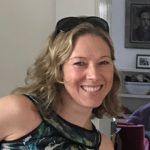 This Act Locally Waco blog post was written by Fiona Bond. Fiona is Executive Director of Creative Waco. She has a background running arts festivals, organizations and cultural projects in her native England and Scotland and is author of “The Arts in Your Church.” In her spare time, she can be found doing an MBA at Baylor, hanging out with husband, Bruce Longenecker, (who teaches religion at Baylor) and their two sons, or playing the bagpipes.
This Act Locally Waco blog post was written by Fiona Bond. Fiona is Executive Director of Creative Waco. She has a background running arts festivals, organizations and cultural projects in her native England and Scotland and is author of “The Arts in Your Church.” In her spare time, she can be found doing an MBA at Baylor, hanging out with husband, Bruce Longenecker, (who teaches religion at Baylor) and their two sons, or playing the bagpipes.
The Act Locally Waco blog publishes posts with a connection to these aspirations for Waco. If you are interested in writing for the Act Locally Waco Blog, please email [email protected] for more information.
By Madiha Kark
When you think of a typical college student, maybe you think of a life in bliss, time spent moving between classes, parties, and extracurricular activities. That is if the daunting task of getting out of bed has somehow been managed. We imagine carefree boys and girls enjoying their youth, spending money they shouldn’t or don’t have, but the reality is far from it. Of the nearly 18 million undergraduates in the country, a shocking 40 percent work at least 30 hours a week. About 25 percent work full time and go to school full time, and about a quarter of them are single parents.
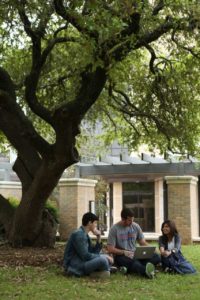 Students at McLennan Community College (MCC) range from high school students who are entering college for the first time to 40-year-olds who are working low-paying physically demanding jobs. They all have a goal of achieving their dreams. They juggle kids, financial stress, typically multiple jobs, and their education. It’s a delicate balance that leaves you physically and mentally exhausted. Community college students deserve your deepest respect, some of them walk a hard path of constant struggle and have to put their dreams on the back burner because of finances or other responsibilities. Many of them continue out of sheer will and belief in the hope for a better future. Here are my four reasons you should choose MCC:
Students at McLennan Community College (MCC) range from high school students who are entering college for the first time to 40-year-olds who are working low-paying physically demanding jobs. They all have a goal of achieving their dreams. They juggle kids, financial stress, typically multiple jobs, and their education. It’s a delicate balance that leaves you physically and mentally exhausted. Community college students deserve your deepest respect, some of them walk a hard path of constant struggle and have to put their dreams on the back burner because of finances or other responsibilities. Many of them continue out of sheer will and belief in the hope for a better future. Here are my four reasons you should choose MCC:
- Affordability:Paying for college is an expensive undertaking. Annual tuition and fees at four-year institutions in Texas can reach upwards of $40,000. MCC offers a great education at an affordable price. The average cost of a two-year degree at MCC is around $12,000.
- Academic Flexibility:MCC is a good option for easing your way into higher education. Not everyone has a clear plan of what they want to study. At MCC, students can start with some core classes and have options to transfer to other programs. MCC partners with various four-year universities that offer classes on campus for bachelors, masters and Ph.D. degrees with easy transfer options.
- Class Size and Personalized Attention: Many community colleges offer smaller class sizes than traditional four-year colleges. That means, students get personal attention and one-on-one time with instructors. At MCC, our student-to-teacher ratio is typically 17:1. According to one reviewer, “Class sizes remind me of that in high school because they are big enough to have a great discussion but small enough to know the names of your classmates.” Additionally, a lot of MCC professors teach at other four-year universities and are experts in their fields.
- S
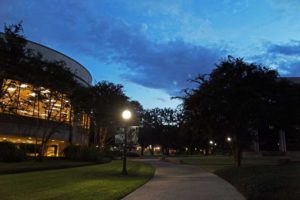 tudent Support Services: A recent Urban Institute study found that from 2011 to 2015, one in five students attending a two-year college lived in a food-insecure household. A lab found that in 2016, 14 percent of community college students had been homeless at some point. These students work extremely hard to make ends meet and simultaneously get the education they need to become more stable. Some of the support services offered at MCC include, the food pantry, academic and personal counseling, single-parent initiatives, career services, and Success Coaches.
tudent Support Services: A recent Urban Institute study found that from 2011 to 2015, one in five students attending a two-year college lived in a food-insecure household. A lab found that in 2016, 14 percent of community college students had been homeless at some point. These students work extremely hard to make ends meet and simultaneously get the education they need to become more stable. Some of the support services offered at MCC include, the food pantry, academic and personal counseling, single-parent initiatives, career services, and Success Coaches.
If you need any more reason to attend a community college, know that these famous people all started at a community college:
- Steve Jobs
- Walt Disney
- Halle Berry
- George Lucas
Registration for Spring 2018 runs Nov. 6-Jan. 13.
 Madiha Kark is a Marketing, Communications and Photography Specialist at McLennan Community College. She holds an M.A. in Journalism from the University of North Texas. She loves to travel, cook, and read nonfiction books.
Madiha Kark is a Marketing, Communications and Photography Specialist at McLennan Community College. She holds an M.A. in Journalism from the University of North Texas. She loves to travel, cook, and read nonfiction books.
The Act Locally Waco blog publishes posts with a connection to these aspirations for Waco. If you are interested in writing for the Act Locally Waco Blog, please email [email protected] for more information.
By Vivian Rutherford
As a child, I was very close to my maternal grandmother. Spending many hours with her are some of my fondest memories. She told me stories about her family, her mom, and the grandmother that raised her.
My great-great grandmother had been a slave and most of her children had been sold into slavery except for one child, my future great- grandmother, who had been born during Emancipation.
Those stories along with ones of her childhood, adult and married life instilled in me a sense of pride in who I was and what I could become. She believed in me.
Annie Lee would live to be almost a hundred years old. Even though she could not read or write, education was her top priority for me. I would sit at her feet for hours listening to story after story.
Eventually I began to ask for her specific tales. I shared those stories with other family members. And as I expanded my reading appetite, I included folk tales and fairy tales. Throughout my school years, opportunities would arise, whether they were plays, speech competitions, church productions in which I was able to grow my expertise.
Becoming a children’s librarian was the perfect direction for me. I was able to share old and new favorite stories each week with our youngest patrons and their families.
As a storyteller, I enjoy the almost tangible connection with the audience. I can actually feel them being drawn in. It is an amazing feeling, one that I both cherish and revere.
After being in Waco for several years, I attended the Tejas Storytelling Festival, an annual storytelling event in Denton, Texas. The festival was an eye opener. Not only were there workshops designed to improve and polish storytelling skills, but the organization itself was an umbrella for local guilds scattered throughout Texas, Oklahoma and Louisiana. They catered to individual tellers and groups. The guilds then supported the local tellers who either were professional, wanted to become professional or were just interested in listening to tellers. Being in a guild provided the storytellers a protective environment in which to share and practice their stories.
In 2007, Terri Jo Mosely (who was a Waco Tribune reporter at the time) was attending the festival when we bumped into each other. I was very impressed with the Tejas Storytelling Association and wondered out loud how nice it would be if we had a guild in Waco. Terri Jo immediately asked me, “Why wonder?” “Why don’t you do it?” And I thought, why not?
There was a nearby guild, the Bluebonnet Scots of Mexia, which along with Tejas, mentored and guided us. We were off to a great start. We began with a few members: Leslie Collier (deceased), Julia Bugh, Terri Jo Mosely, Beulah Barksdale, Barbara Bridgewater, Marian Fleischmann, Tom Taylor and myself.
During that first year, we hosted our very first Tellabration! Tellabration is a world-wide national event celebrating storytelling and Waco was a part of it!
The next event added was “Walking Tales” at Oakwood Cemetery. We wanted to combine history with storytelling. Highlighting lives that influenced and helped to build Texas was the ideal option.
In 2016, the Guild was given the green light to facilitate and host for the first time a Tejas Summer Conference in Waco. This Bi-annual conference teaches the storytelling nuts and bolts. The conference included attendees from as far away as New York.
We’ve been able to participate, especially with our youth, in various activities such as Art on Elm Street, Barnes and Noble Storytime, the Cultural Arts Fest, various nursing homes and of course Tellabration!
Ultimately, I would love to see an annual storytelling festival right here in Waco. Storytelling as a community brings families together, strengthens our identity, brings out character, celebrates our diversity and unites us in our commonalities. We are stronger for weaving our stories together.
Teaching the art of storytelling to young people, adults and students is a fun way to preserve and share the art. And, it forever keeps me in the learning mode.
A celebrated moment in my storytelling journey occurred this past Easter, 2016. Several churches came together to create a momentous storytelling event. For several weeks at the Hippodrome, a variety of tellers from diverse backgrounds shared stories and experiences with the Waco community. I was honored to be included. It was a total life changing experience for me!
I see the Heart of Texas Storytelling Guild as a virtual front porch. In days gone by, people would see someone sitting and rocking on the porch. They would sit a spell and talk. Others would stop and join them and before you knew it, the stories would flow.
That’s what we do every 4th Saturday of the month (holiday exceptions).
We let the stories flow. Some are sharing just for the sheer joy of telling, knowing someone is listening with awe. Some are sharing with an agenda, needing specific critiques. Some are there as beginners, gleaning from the many years of experience. Some are there to take it all in and loving every minute. We would love to have you come, sit a spell, tell your story!
Tellabration! 2017
- November 11 @ 6:00 pm – 8:30 pm
- Austin Avenue United Methodist Church (Fellowship Hall), 1300 Austin Avenue
- Tickets: $12/12yrs-adults, $6/4yrs-11yrs
Tellabration! celebrates the ageless art of storytelling. This local event, sponsored by The Heart of Texas Storytelling Guild and celebrated world-wide, is our way of sharing this traditional art within our community. Come enjoy a feast of stories coupled with a fine meal. This year we celebrate Kyndall Rae Rothaus, storyteller, poet and preacher. She is the pastor of Lake Shore Baptist Church in Waco, and the author of Preacher Breath (Smyth and Helwys, 2015).
For more information: Vivian Rutherford, 254-717-1763, [email protected]
www.hotstorytellingguild.org
Heart of Texas Storytelling Guild
What: An Organization of Storytellers and Supporters dedicated to preserving the Art of Storytelling
When: We meet the 4th Saturday of each month (Holiday exceptions)
Adults: 10:30-12 noon Youth: 1:30-3pm
Where: Waco-McLennan County Library, South Branch, 23 S. 18th St. (at dead end of 18th) Waco, TX
Call or email for more information: Vivian Rutherford (254) 717-1763, [email protected] www.hotstorytellingguild.org
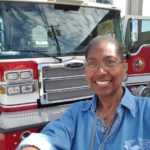 Vivian Rutherford is originally from Houston, Texas. She moved to Waco in 2000 and joined the Waco-McLennan County Library System as a Children’s Librarian. She began The Heart of Texas Storytelling Guild in 2007. She enjoys reading, cooking, listening to music and playing the piano. She is a wife, and mother to 3 kids, 3 cats and 1 dog.
Vivian Rutherford is originally from Houston, Texas. She moved to Waco in 2000 and joined the Waco-McLennan County Library System as a Children’s Librarian. She began The Heart of Texas Storytelling Guild in 2007. She enjoys reading, cooking, listening to music and playing the piano. She is a wife, and mother to 3 kids, 3 cats and 1 dog.
The Act Locally Waco blog publishes posts with a connection to these aspirations for Waco. If you are interested in writing for the Act Locally Waco Blog, please email [email protected] for more information.
